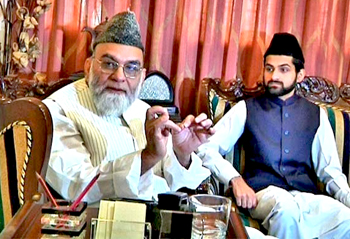 New Delhi, Nov 21: The Delhi High Court today said the ceremony (dastarbandi) to anoint Shahi Imam Maulana Syed Ahmed Bukhari's son as the Naib Imam of Jama Masjid "would not amount to an appointment".
New Delhi, Nov 21: The Delhi High Court today said the ceremony (dastarbandi) to anoint Shahi Imam Maulana Syed Ahmed Bukhari's son as the Naib Imam of Jama Masjid "would not amount to an appointment".
A bench of Chief Justice G Rohini and Justice Rajiv Sahai Endlaw made the observation after taking into account the contentions of the Centre, Delhi Wakf Board and petitioners, who have challenged the ceremony, adding that in such a situation there is no need to stay the function.
The court also noted that under the Wakf Act, 1995, the law only "provides for a mutawalli (manager) of a wakf and contains no provision for appointment of Imams of Wakf properties, even if a masjid".
"We are of the opinion, that in the face of the contentions of the petitioners that Maulana Syed Ahmed Bukhari has no right in law or otherwise to anoint his son as the Naib Imam and which is supported by the Delhi Wakf board...
"...the anointment ceremony (Dastarbandi) scheduled on November 22, 2014, even if not stayed, would not amount to anointment/appointment of the said son of Maulana Syed Ahmed Bukhari as the Naib Imam of the Jama Masjid. We, therefore, do not feel any need to pass any ad-interim order restraining the same," the bench said.
The court also did not restrain Bukhari from holding the ceremony at Jama Masjid, as sought by the petitioners, saying he and his family have been using the same as their residence for the last several years.
"However, we clarify that the ceremony so held and the anointment made therein of the youngest son of Maulana Syed Ahmed Bukhari or any other person as the Naib Imam of the Jama Masjid shall be subject to further orders in this petition and shall not vest/ create any rights or special equities in favour of any person," the court said.
It also issued notice and sought responses of the Archaeological Survey of India, Delhi government, DDA, MCD, city police, Wakf Board, CBI as well as Bukhari by the next date of hearing on January 28, 2015.
The bench also noted that "no answer is forthcoming" from the Wakf Board as to why it "has not exercised any rights or supervision over the Jama Masjid" or why it has "allowed Maulana Syed Ahmed Bukhari to appropriate all earnings from the said Masjid and also not taken any action for accounts thereof being not rendered inspite of court directions".
The court's order came on three PILs challenging the Shahi Imam's decision to appoint his son as the Naib Imam.
Yesterday, during arguments on the three petitions, the Centre and the Wakf Board had submitted before the court that the ceremony by Jama Masjid Shahi Imam anointing his son as his deputy and successor has no legal sanctity.
The Board, in its response to the court's query as to what was their legal position on the issue, had also said that it would be holding a meeting soon and action will be taken against Bukhari for what he has done.
Earlier, the Centre had said that the Mughal-era mosque Jama Masjid is a Wakf property and it has to decide how the rule of primogeniture applies on anointment of new Shahi Imam, which has come under challenge.
ASI had also requested the court to declare the city's Jama Masjid as an ancient monument because of its national importance while contending that it needs to be protected.
The PILs filed by Suhail Ahmed Khan, Ajay Gautam and advocate V K Anand had said Jama Masjid is a property of Delhi Wakf Board and Bukhari as its employee cannot appoint his son as Naib Imam (deputy Imam).
The petitions had said Shahi Imam had announced on October 30 that his 19-year-old son would succeed him as the next Shahi Imam and the ceremony of 'Dastarbandi' would be held on November 22.
The pleas had alleged that the Shahi Imam was a public post and not the "personal property" of Syed Ahmed Bukhari and IMAMAT (the position of a divinely-appointed leader) is not transferable.
The PILs had also asked the court to declare as invalid the appointment of Bukhari as the Shahi Imam of Jama Masjid and had also sought directions for Delhi Wakf Board to take over the affairs of Jama Masjid and appoint a new Shahi Imam.
Bukhari had recently sparked a controversy by announcing that he has invited Pakistan Prime Minister Nawaz Sharif for the ceremony for anointing his son as the deputy Imam but did not invite Prime Minister Narendra Modi.






Comments
Add new comment